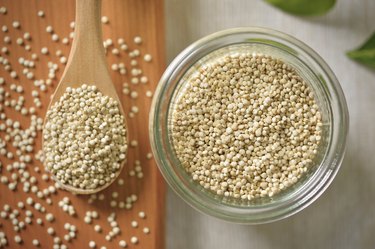
Quinoa is a grain-type food that has been a staple in the South American diet and is gaining interest among Americans because of the great health benefits it offers and its versatility. Quinoa calories are low, and it is gluten-free, making it a great grain choice for those with celiac disease.
Quinoa has a low glycemic index and contains fiber, which makes it a good carbohydrate choice for people with diabetes. Quinoa can be incorporated into many types of dishes, including soups, casseroles and salads, and can be enjoyed as a side dish like rice and potatoes.
Video of the Day
Video of the Day
Read more: Quinoa and Weight Loss
Quinoa Calories and Carbs
According to the USDA, at least half of the grains consumed each day should be whole grain foods. A 1/2 cup quinoa serving size includes 111 calories.
Quinoa carbs clock in at 20 grams per 1/2 cup serving. Also, because it is a whole grain food that contains fiber and has a low-glycemic index — as described by Harvard Health Publishing — it can assist in slowing the rise in blood sugar levels that occurs after eating.
Quinoa is a good source of dietary fiber, with a 1/2 cup serving containing almost 3 grams. Fiber is the indigestible part of vegetables, fruits, whole grains, legumes and nuts. It contributes to digestive health by keeping you regular and helps make you feel full and satisfied after eating.
According to the National Academies of Sciences, men need at least 38 grams of fiber per day, while women need 25 grams. One serving of quinoa meets 8 to 12 percent of your daily fiber needs.
Read more: Brown Rice Vs. Quinoa
Boost Protein, Reduce Fat
Quinoa is a good source of high-quality protein compared with other grain foods. Protein is an important nutrient for the body, as it is needed for growth and repair functions, and one half-cup serving of quinoa contains about 4 grams of protein.
According to the National Academies of Sciences, healthy women age 19 and above need 46 grams of protein per day. Healthy men of the same age need 56 grams per day. Including quinoa as part of your meal can assist in meeting your daily protein needs, providing 7 to 9 percent of your daily requirement, and is a great protein source for those who are vegetarian.
Quinoa is low in fat, with 3.6 grams of total fat per serving. Of that amount, less than 1 gram is saturated — the "bad" kind of fat that can raise cholesterol levels in your blood and contribute to heart disease, according to Mayo Clinic.
Watch Your Salt Intake
Quinoa is naturally low in salt, with only 6 milligrams per 1/2 serving — another one of quinoa's benefits. This is good news, particularly if you have high blood pressure or other heart conditions that require a low-sodium diet.
According to the American Heart Association, healthy adults should consume no more than 2,300 milligrams of sodium per day. If you have heart disease or related risk factors, that number drops to 1,500 milligrams.
- USDA: "All About the Grains Group"
- National Academies of Sciences: "Macronutrients"
- American Heart Association: "How Much Sodium Should I Eat Per Day?"
- USDA National Nutrient Database: "Quinoa, Cooked"
- Mayo Clinic: "Dietary Fats: Know Which Types to Choose"
- Harvard Health Publishing: "Glycemic Index for 60+ Foods"